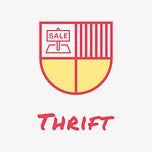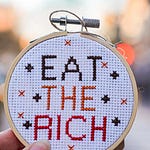
I started following Gaia Rattazzi on Instagram last year, and I’ve learned a lot about the fashion industry and what sustainability might look like from her very thoughtful posts. Each post is carefully crafted to explain how where our clothes are made and where we buy them has a profound impact on the people who make them and the environment.
Gaia is based in Italy but was studying in the U.K. before the pandemic hit. She completed a thesis about water pollution is the result of the fashion industry’s model of encouraging overconsumption. Gaia is dedicated to spreading awareness about these different issues in the fashion industry through her Instagram account and website.
I talked with Gaia about how she built her following and why this topic is so important to her. Our full interview is out now, but you can also read some of my favorite snippets below.
Cheers,
Maggie
Maggie: The first question I have, and not even really a question, just honestly wanted you to tell me a little bit about your love of clothes and fashion and how that maybe led you to reexamine your shopping habits.
Gaia: I’ve always been a big fan of fashion, and I’ve always wanted to create my own style. You know I spend so much time in the morning trying to create outfits. Yeah, it’s something that’s always interested me and, at the same time, I’ve always been interested in sustainability. I guess my parents really got me into it. Since I was little they encouraged recycling and making things last. We have solar panels on our home, we’re getting an electric car, so my parents are really into it and I guess that’s really what influenced me.
At the beginning I was really more into the food industry, like I was trying to be vegan and trying to lower my impact in that side of my lifestyle. But at the same time I was accumulating lots of fast fashion and accumulating lots of clothes that I didn’t really use and they lasted so little; I would wear them once and then donate them, and I realized that can’t be sustainable. So I tried to incorporate both sustainability and fashion into my life.
Maggie: Sometimes I think that we almost think of thrifting and secondhand shopping as something that exists outside of capitalism, like we found a way to stick it to the man.
Gaia: And I think that, you know, it’s the fact that we have so many items in thrift stores and that so many items get donated, I think that it’s kind of a byproduct of the fast fashion industry. So as we’re buying a lot of clothes, as a lot of clothes are being produced, then charity shops become overwhelmed and they get so many donations, so that’s a good thing, obviously, because we can give a new life to things instead of buying new, but at the same time if we bought less fast fashion there probably wouldn’t be as many clothes in charity shops and thrift stores.
I felt like I was buying a lot of things because I felt, ‘OK, that’s good, so I can buy as much as I want.’ But then I thought, on one side we might be taking clothes away from poor people because a lot of people from low-income neighborhoods really rely on these shops and if we just go there and do thrift hauls then they might be left with— Not with nothing, because there’s a lot of stock, but maybe the best things will be gone, and then the people who rely on it would—
Maggie: Like their size would be gone or something?
Gaia: Yeah, and then I was [thinking] about how it basically encourages overconsumption because I saw a lot of thrift hauls, as I said. We’re going to thrift stores, we’re going to the charity shop, and I noticed that people were buying just anything, basically, without even thinking, and I thought, ‘Is that really sustainable?’ I think it’s all in the mindset, as well. It’s not just about where you shop from, it’s how you shop.
Maggie: What do you mean when you say overconsumption? Is it that thrifting isn’t breaking the habit, which is the ultimate underlying problem?
Gaia: Yeah, exactly. To me, overconsumption is— I mean, it’s still something I struggle with even though it’s something that I know impacts— I feel like it’s so easy now, especially because of all the marketing and advertising that we’re subject to through social media, email marketing, you know, banners everywhere. There’s this culture all around us that we’re sucked into overconsumption where we’re just told to buy things that we don’t really need and that was quite overwhelming to me even from a mental health point of view, because I felt like there was never enough, I always needed to chase the next best thing.
I think that was becoming a bit toxic, and so I thought that even if I switch this to secondhand shopping, is that really an improvement or is that just the same thing but just in a different place? Obviously that’s better, but you’re not really fixing the underlying problem that we— I feel like sustainability just means that we need to do as much as possible with what we have and not depleting the resources we have. That requires a different kind of consumption, and it’s hard, but we do need to be thinking more when we shop.
I feel like with low prices in thrift shops it kind of becomes a bit like, you know, fast fashion because you just buy it because it’s cheap, and then if it’s going to be sitting in your wardrobe where it’s not used, then it probably could serve someone else better than— It would probably be better to change your habits.
Maggie: I’m sure a good quality t-shirt costs anywhere from like $35-$40. Maybe a little less than that, in the $20 range, but I could foresee myself getting a little price tag shock about a single t-shirt costing that much money.
Gaia: Before globalization everything was made locally and clothes were so expensive that we would buy so few and make them last. That was a totally different way of shopping from what we do now, and, obviously, that doesn’t mean you have to be a minimalist because I, myself, like to adopt that mentality, but at the same time I like to have variety in my closet.
I feel like we need to question price tags more, because, yes, it is a lot—like what you’re saying, a t-shirt in the $20-$30 range, absolutely—but, at the same time, clothing requires a lot of resources and so many steps, and it goes around the world for the cotton to be produced, and then to be turned into fiber, and the fiber into garment, and then dyed and finished. So many steps go into that, and if you think about how those steps can be condensed into a price tag of $5, then that can’t be sustainable, someone is paying that price.
There is a possibility of making sustainable fashion cheaper, especially if you do everything in-house and you don’t have to pay a lot for shipping costs. What I guess those brands are able to do, fast fashion, they’re able to just mass produce, which drives down the price. At the same time, there’s so much pressure on the suppliers to produce as fast as possible, as cheap as possible, and so someone is being exploited along the way, and that’s obviously not sustainable. I think that it is possible for something to be more affordable but still sustainable, but we do need to change our mindset as to what we’re accustomed to when it comes to pricing with clothes.
Maggie: What do you think is the Western, whitewashed definition of sustainability?
Gaia: I think it’s all got to do with consumption and what we can buy, and that’s actually, I don’t know if you’ve heard of her, but Elizabeth Cline wrote a couple of books on sustainable fashion, and she wrote an article recently talking about how we often think consumption and consuming in a more mindful way is the best thing to do, but really she gives a different point of view. We’ve kind of lost the collective action driver that really created real change throughout history, and so what she basically was saying is that we need to understand the root of the problem and organize against the biggest polluters, instead of taking it upon ourselves to change the system. I always say that small actions make a difference over time, but she said in her article that it created this ethical consumerism, this alternative market, rather than changing fast-fashion brands, and that’s so true! We’ve seen a lot of small businesses start and grow, which is awesome, but isn’t really changing the brands that hold the most power?
So I think the whitewashed view of sustainability still has to do with consumption, and also a sort of white saviorism. Especially with ethical brands, like there are lots of brands that basically start and their whole mission is about empowering communities in the global south, but it should be more about helping them find their voices rather than putting yourself at the center of it and wanting people to think you’re a good person when we have so much to learn from these communities. They should be put at the forefront. They should have the profit they deserve from making the clothes, instead of just getting photos taken and put on a website.
Maggie: Do you see your blog and Instagram account as ways of using your privilege to bring notice to these different lenses?
Gaia: Yeah, absolutely! I mean, I’m trying to do that. I don’t know if I’m doing enough yet; I think that there are definitely things I can improve. I was actually thinking recently about how maybe I want to get more people to talk to me, maybe people of color sharing their experiences. Maybe thinking about how they [people of color] think the industry can be racist or, yeah, getting more diverse voices because I obviously can’t be an expert in everything, I can’t know every single aspect of sustainable fashion so it’s good to get different perspectives.
I guess everyone has their own view and their own experience with sustainability, so it’s good to see the different views on it and the different ways to incorporate it in our lives. But, yeah, I do try to raise awareness about things, and hopefully that does make a difference. It’s not easy balancing it, especially with Uni and stuff, but I’m always looking for ways to improve.












Share this post